|
|
|
Sort Order |
|
|
|
Items / Page
|
|
|
|
|
|
|
| Srl | Item |
| 1 |
ID:
087410
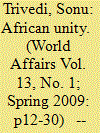

|
|
|
|
|
| Publication |
2009.
|
| Summary/Abstract |
It has become imperative for Africa to map out a starategy ogf regional cooperation and integration and lay the foundation for sustainable development. The establishment of AU is a step in that direction. It aims at achieving greater unity and solidarity and accelerating the political and socio-economic integration of the continent.
|
|
|
|
|
|
|
|
|
|
|
|
|
|
|
|
| 2 |
ID:
155536
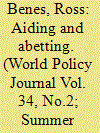

|
|
|
|
|
| Summary/Abstract |
International organizations have repeatedly deceived donors to secure ever more funding for AIDS-relief efforts. Ross Benes discusses the incentives for biomedical companies and groups like UNAIDS to mislead the public, while cheaper, more effective solutions remain underfunded.
|
|
|
|
|
|
|
|
|
|
|
|
|
|
|
|
| 3 |
ID:
086705
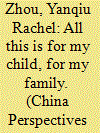

|
|
|
|
|
| Publication |
2009.
|
| Summary/Abstract |
Social discrimination and limited health care resources drive many people living with HIV/AIDS in China to seek help from their own families. This paper, which is based on a qualitative study of the experiences of this population, examines how the notion of family obligation has influenced how these individuals organise various aspects of their daily lives. Viewing family obligation as a matter of reciprocal relationships, a closer look is taken at the ways in which these individuals exercise their autonomy to fulfil those obligations and pursue their moral self despite their health status. The study suggests the significance as well as the limitations of incorporating family support into AIDS interventions in the Chinese context.
|
|
|
|
|
|
|
|
|
|
|
|
|
|
|
|
| 4 |
ID:
120791


|
|
|
|
|
| Publication |
2013.
|
| Summary/Abstract |
HIV sensitisation campaigns often aim to empower people living with HIV or AIDS (PLWHA) to enable them to cope with their illness by getting on with normal life as best as they can. However, contained within these messages are implicit assumptions about the needs of PLWHA. This research found that in Jamaica PLWHA's reproductive health needs are considered to be met largely by condoms. However, PLWHA respondents in this study expressed desires to have children and felt that their right to this was being denied. As such, dominant HIV sensitisation messages fail to respond to Jamaican PLWHA's own perceptions of their needs. This information is of importance, as the focus of the international HIV response moves away from simply preventing new infections to supporting those who have already been infected through locally appropriate interventions. As part of this, local perceptions need to be acknowledged 'up-stream' in HIV programming.
|
|
|
|
|
|
|
|
|
|
|
|
|
|
|
|
| 5 |
ID:
103711


|
|
|
|
|
| Publication |
2011.
|
| Summary/Abstract |
As socio-medical phenomena, epidemics are revealing of the cultures in which they are experienced. The HIV/AIDS epidemic in Africa exposes antecedent tensions between state and society, and, on a broader canvas, between the global north and south. As a contribution to the emerging literature on the social ramifications of HIV/AIDS, this article examines the saga of the Nigerian physician and immunologist, Dr Jeremiah Abalaka, who like other innovators in sub-Saharan Africa claims to have developed a curative HIV vaccine. Whilst articulating the social conditions that enabled Abalaka to thrive, the article explores the marked differences in the reaction to his 'discovery' among state representatives, the scientific establishment, the general public, people living with HIV, and the media. Finally, the article valorizes the emergence of new actors in the African health sector, and the diversity of strategies used by ordinary people to achieve and maintain wellness.
|
|
|
|
|
|
|
|
|
|
|
|
|
|
|
|
| 6 |
ID:
145993
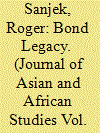

|
|
|
|
|
| Summary/Abstract |
This article surveys the intellectual, fieldwork, and professional career of the anthropologist George Clement Bond. Beginning in 1963, he conducted fieldwork in Zambia over four decades and produced a substantial body of writings on history, ritual, colonialism, and contemporary rural life. He also worked in Uganda in the 1980s on the HIV/AIDS crisis. From 1968, he taught at Columbia University, where he was Director of the Institute of African Studies. Bond’s measured outlook on the interrelated conceptual orientations and practical realities that confront the people anthropologists work among and learn from, and also shape their own circumstances, gave meaning and purpose to his work, which was recognized in honors and awards, speaking invitations, fellowships, and elected professional offices.
|
|
|
|
|
|
|
|
|
|
|
|
|
|
|
|
| 7 |
ID:
103592
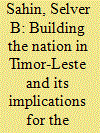

|
|
|
|
|
| Publication |
2011.
|
| Summary/Abstract |
This article contributes to the discussion of the international democratisation of the so-called 'post-conflict' or 'fragile' countries by addressing one of the most important but least studied issues in the literature-the relationship between democracy and nation-building. It does so by analysing the major socio-political aspects of the democratic nation-state-building process in Timor-Leste in the post-1999 period. It argues that contemporary international democratisation policies and practices prioritise the 'stateness' problem, conceptualised by reference to a set of organisational, procedural and functional concerns. Little attention is, however, paid to the 'nationness' question. As the experience in Timor-Leste indicates, it is the national ideas that determine the structural and operational parameters of democratisation, which is, after all, a process of socio-political transformation by which political power and wealth are redistributed amongst a variety of competing societal interests.
|
|
|
|
|
|
|
|
|
|
|
|
|
|
|
|
| 8 |
ID:
187528
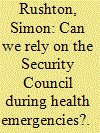

|
|
|
|
|
| Summary/Abstract |
In passing resolutions on HIV/AIDS, Ebola and COVID-19, the Security Council has shown at least a passing interest in health, and calls have been made to give it a more central role in global disease response. In this contribution, reflecting on two decades of the UNSC’s engagement with health emergencies, I suggest we should be cautious about making the Security Council too central to pandemic response. I focus on three problems with the Council: that it is highly politicised and deeply divided in ways that mean it cannot be relied on to act when needed most; that when it does act it tends to do so too late, once an emerging problem has already become a global crisis; and that it does not in any case necessarily have the tools at its disposal to make a meaningful contribution. Instead, I argue, it is precisely its role as a ‘health outsider’ that enables the UNSC to occasionally make a contribution. It would be risky indeed to hand such a body real responsibility for crisis response. That is a task much more likely to be performed assiduously (if often imperfectly) by a body such as the WHO.
|
|
|
|
|
|
|
|
|
|
|
|
|
|
|
|
| 9 |
ID:
104038
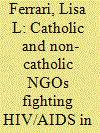

|
|
|
|
|
| Publication |
2011.
|
| Summary/Abstract |
While governments in sub-Saharan Africa work to provide in-country relief for the HIV/AIDS crisis, much health care and infrastructure comes from local or international non-governmental organizations (NGOs). The literature on NGOs suggests that collaboration increases their efficacy. Many non-Catholic NGOs do not work collaboratively with Catholic NGOs on HIV/AIDS, though the Catholic Church has rich and varied resources at its disposal for relief work. Observers often characterize the incompatibility of Catholic and non-Catholic NGOs as tactical, especially with regard to condom use. However, divergent issue framing is a critical and more fundamental distinction between the two groups. Contrasting the Catholic Church's unique spiritual frame with the scientific frame of many non-Catholic NGOs highlights the epistemological and teleological differences between the two. Reconciling these differing approaches, or finding ways to cooperate despite them, is a key element of promoting broader NGO collaboration on HIV/AIDS relief work. This theoretical analysis suggests directions for future empirical research.
|
|
|
|
|
|
|
|
|
|
|
|
|
|
|
|
| 10 |
ID:
080720
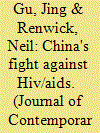

|
|
|
|
|
| Publication |
2008.
|
| Summary/Abstract |
Officially, there were 650,000 people living with HIV in China in 2005.1 The Chinese government has pledged to keep the total under 1.5 million by 2010. The study argues that China must emphasize non-epidemiological factors as mutually-reinforcing factors sustaining the disease. The fight is entwined with profound economic and social transition. Government and civil society have engaged with the principles and agencies of global HIV/AIDS governance. But HIV intersects with normative regimes addressing issues of humane governance in the widest socio-economic and political sense. Based upon primary and secondary research, the study reviews the evidence of the HIV/AIDS challenge facing China, considers the nature and quality of the national response, and evaluates the relationship of global and national regimes
|
|
|
|
|
|
|
|
|
|
|
|
|
|
|
|
| 11 |
ID:
095195
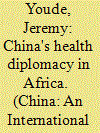

|
|
|
| 12 |
ID:
098505
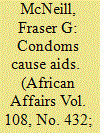

|
|
|
|
|
| Publication |
2010.
|
| Summary/Abstract |
This article presents a critique of the position that South Africans are engaged in a process of collective HIV/AIDS denial. Ex-President Mbeki's well-documented belief that HIV does not lead to AIDS, and that South Africans are not dying of AIDS-related disease, has been used by academics and journalists to explain the widespread public silence around the pandemic. The article argues that the complex social processes employed to create and maintain the avoidance of open conversation around HIV/AIDS are rooted, not in Mbeki's denialism, but rather in conventions through which causes of death can, and cannot, be spoken about. Through case studies of poisonings and public performances by HIV/AIDS educators, the article demonstrates that by invoking public silence and coded language, 'degrees of separation' are constructed that create social distance between individuals and the unnatural cause of another's death. Far from a collective denial, acts of public silence and obfuscation should be read as protestations of innocence: attempts to drive a wedge between open, public knowledge of death and potential implication in the increasing number of AIDS-related fatalities. HIV/AIDS prevention policies based on inadequate understandings of this wider context have given rise to the social construction of peer educators - and condoms as their central symbol of prevention - as vectors of the virus.
|
|
|
|
|
|
|
|
|
|
|
|
|
|
|
|
| 13 |
ID:
101376
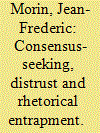

|
|
|
|
|
| Publication |
2010.
|
| Summary/Abstract |
While the WTO secretariat, key delegations, several NGOs, and industry publicly present the 30 August 2003 WTO Decision as an attempt to reconcile intellectual property with access to medicines, our research shows otherwise. We draw on qualitative analyses of 54 interviews and a lexicometric analysis of press releases to show that their enthusiastic public statements contrast deeply with their internal, cynical beliefs. Most of these actors not only consider the WTO Decision to be fundamentally flawed but claim to have known this prior to its adoption. We argue that a procedural norm of consensus-seeking impeded traditional bargaining over this sensitive issue and that distrust among participants hindered truth-seeking deliberation. Caught between strategic and communicative actions, state and non-state actors found themselves trapped in their own rhetoric of reconciling intellectual property with access to medicines. They realized that the appearance of a solution, rather than a functional solution, provided the only realistic outcome to a fruitless and publicly damaging continuation of debate. From a theoretical perspective, this case study sheds a new light on the gray zone between rational choice theory and constructivism, where both discourse and strategies matter. From an empirical perspective, it illustrates the risk of seeking consensus within international regimes when the procedural norm of consensus coexists with a high level of distrust.
|
|
|
|
|
|
|
|
|
|
|
|
|
|
|
|
| 14 |
ID:
098342
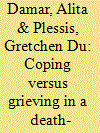

|
|
|
|
|
| Publication |
2010.
|
| Summary/Abstract |
The aim of this study was to understand how AIDS-bereaved women in Indonesia cope in a society where death is believed to be fated. Data analyses were conducted based on the women's interview transcripts and journal entries. Each of the women experienced at least three traumatic life events. The most challenging experience was learning that they have contracted a disease they regarded as associated with prostitution. Given the short lapse of time between their husbands' deaths and learning about their seropositivity, biographical disruption appeared to have acted as an 'analgesic', while concerns to protect their children seemed to have triggered biographical reinforcement. This phenomenon may have brought about a positive bereavement outcome. Specific counselling programmes for women affected by HIV/AIDS are needed, but emphasis should first be placed on improving their wellbeing and their perception of stigma.
|
|
|
|
|
|
|
|
|
|
|
|
|
|
|
|
| 15 |
ID:
115211
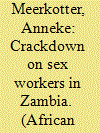

|
|
|
|
|
| Publication |
2012.
|
| Summary/Abstract |
In May 2012, Zambia's Inspector-General of Police announced a crackdown on sex workers. This commentary discusses the rationale behind this proposed crackdown and the problems associated with such a policy response.
|
|
|
|
|
|
|
|
|
|
|
|
|
|
|
|
| 16 |
ID:
099895
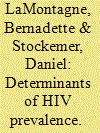

|
|
|
|
|
| Publication |
2010.
|
| Summary/Abstract |
Slightly over 25 years since the identification of the virus, Human Immunodeficiency Virus/Acquired Immune Deficiency Syndrome (HIV/AIDS) epidemic has killed millions of people and has expanded to become one of the greatest dangers in the world, threatening individuals, economies, communities and states. To better understand the factors underlying the wide discrepancies in HIV rates across countries, and to better prioritize interventions in the global fight against HIV/AIDS, it is imperative to build sound models that help to identify determinants of worldwide HIV prevalence. While scholars of various disciplines such as political science, anthropology and health studies have engaged in this endeavor, these studies have found divergent results. Seeking to construct a viable model, this current study examines nine theory-informed variables - income inequality, regime type, gender equality, GDP per capita (PPP), control of corruption, per cent Muslims in a country, education, contraceptive use and availability of antiretroviral medication that potentially affect a state's HIV prevalence. This research finds that conditions favorable to a decrease in HIV are low income inequality, a high per cent of Muslims in a country's population and high contraceptive use.
|
|
|
|
|
|
|
|
|
|
|
|
|
|
|
|
| 17 |
ID:
142624


|
|
|
|
|
| Summary/Abstract |
This article explores the interplay between international donors and local NGOs in Kyrgyzstan's HIV/AIDS sector. It argues that donors have transposed ready-made policies without sufficient consideration of the local context and that NGOs have responded strategically, adapting their proposals and reports to the expectations of donors. This complex interplay has resulted in unintended consequences that have undermined an effective response to the HIV/AIDS epidemic. It has given rise to ‘virtual realities’ detached from developments on the ground. The funding system has also led to corruption and misappropriation of funds and the failure of NGOs to become sustainable. Largely bypassing the state in the allocation of funds, international donors have also undermined an already weak state.
|
|
|
|
|
|
|
|
|
|
|
|
|
|
|
|
| 18 |
ID:
155794


|
|
|
|
|
| Summary/Abstract |
Drawing on 70 interviews with civil society staff in Malawi, I argue that when development trends and issues in the country change, at donors’ wishes, organizations proactively strategize to vie for donor funds. Collected over three research trips, my data show that between 2008 and 2010 there was a widespread belief among civil society in Malawi that climate change was becoming the “it” issue, surpassing HIV/AIDS in predominance. Alongside this belief, there was a dynamic, if invisible, process of organizational repositioning. Comparing the earlier interviews with those conducted in 2014, I contend that the issues of focus, while interesting, are less telling than the ways Malawian organizations endeavor to adapt and respond to them. This paper adds a critical dimension to development literature, investigating a process that occurs when development agendas change.
|
|
|
|
|
|
|
|
|
|
|
|
|
|
|
|
| 19 |
ID:
103962
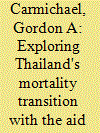

|
|
|
|
|
| Publication |
2011.
|
| Summary/Abstract |
The project Thai Health-Risk Transition: A National Cohort Study seeks to better understand the health implications of modernisation and globalisation forces impacting on Thailand. As part of its 'look-back' component this paper seeks, using available life tables, to document the country's post-war mortality transition. The onset of transition through mass campaigns of the late 1940s and 1950s is first discussed before attention turns to the life tables. They are predictably far from flawless, but careful analysis does permit trends that have seen around 30 years added to life expectancy to be traced, and age patterns of improved survivorship and their relation to initiatives to improve health to be examined. The broad benefits generated by mass campaigns, ongoing improvements in infant and early childhood mortality, and a phased impact of the expansion of primary health care in rural areas on adult survival prospects after the mid-1970s are demonstrated. The paper also investigates the consequences for mortality of a motorcycle-focused rapid increase in road fatalities in the late 1980s and early 1990s and the HIV/AIDS epidemic that developed after 1984.
|
|
|
|
|
|
|
|
|
|
|
|
|
|
|
|
| 20 |
ID:
080870
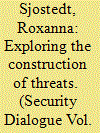

|
|
|
|
|
| Publication |
2008.
|
| Summary/Abstract |
In April 2006, Russian President Vladimir Putin publicly declared HIV/AIDS to be a threat to Russia's national security and proposed a guiding strategy to handle it. This move stood in sharp contrast to previous policies of the Russian government. Despite the fact that Russia has experienced one of the fastest growing rates of HIV/AIDS in the world since the turn of the millennium, the government's involvement had previously been minimal, not recognizing AIDS as a national security threat. The question then arises: when is a threat really threatening? This article contributes to the development of theories on threat-framing and security decisionmaking by suggesting an analytical framework that incorporates explanatory variables from different levels of analysis. The adoption of a broad theoretical position facilitates a comprehensive understanding of time and space variations in the securitization of issues. The article demonstrates that norms and identity constructions at the international and domestic levels, combined with their internalization by individual decisionmakers, can together explain Putin's move, and that these factors are of different importance at difference stages of the threat-construction process
|
|
|
|
|
|
|
|
|
|
|
|
|
|
|
|
|
|
|
|
|